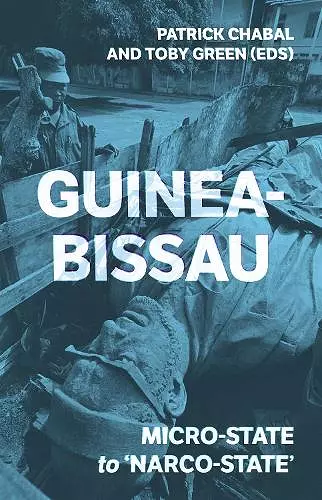Guinea-Bissau
Micro-State to 'Narco-State'
Patrick Chabal editor Toby Green editor
Format:Paperback
Publisher:C Hurst & Co Publishers Ltd
Published:30th Jun '16
Currently unavailable, our supplier has not provided us a restock date

Since 1998 Guinea-Bissau has suffered a series of coups which outside analysts have linked to its emergence as West Africa's first 'narco-state'. Yet what does this mean for the country and the nature of the state in postcolonial Africa? What links Guinea-Bissau's instability with questions of wider regional and global security? What would a stable government look like in Guinea-Bissau, and what are the conditions for its achievement? The book constitutes the first synthetic attempt to grasp the consequences of the crisis in Guinea-Bissau. It fills a void in scholarship and policy analysis with a synthesis of both what has happened in the country and the wider implications for postcolonial African nation-building. With the current crisis in Mali, and rising interest among geopolitical actors in the region's stability, the contributors offer timely reflections on the causes and consequences of instability in one of Africa's most fragile states. Together they demonstrate how the undermining of the ideological construction of post-colonial African states derives from the historical fragilities and geopolitical conflicts which are acted out there. This is also the last book that Patrick Chabal, a significant scholar in contemporary political theory related to Africa, worked on.
[An] excellent collection of essays on the West African country’s complicated politics . . . the first comprehensive English-language study of the topic to appear in more than a decade. * Foreign Affairs *
A landmark volume which delves into the political tumult in this tiny West African nation over the last 18 years . . . The authors give a positive model of writing about the history of politics in an African context, interrogating the exact scope of state corruption and failure. * Africa at LSE blog *
‘One of the most comprehensive overviews to date of Guinea- Bissau’s trajectory since independence. . . Chabal and Green, in short, bring together sophisticated analyses that draw on the country’s long history and widen our perspective to include global political and economic paradigms—while also celebrating the country’s unique society. The book is well positioned to reimagine a modern Guinea-Bissau built on indigenous solutions.’
‘This work is a fitting tribute to the life and legacy of the late Patrick Chabal, who worked tirelessly to portray honestly the history, politics, and people of Guinea-Bissau . . . [a] major contribution . . . . each of the authors tracks meaningful structural currents and thoughtfully engages with the implications of these currents in relation to “the crisis.”’
Well versed in the history, anthropology, contemporary politics and literature of Guinea-Bissau, the team assembled by Chabal and Green offers the most up-to-date and comprehensive account of the dramatic transformation of the country, from the socialist promise of Amilcar Cabral to the 'narco-state' of today. An all-encompassing and invaluable survey, the seven chapters offer a fascinating contrast between the failed Guinea-Bissau state, the increasing importance of the narcotics trade as a source of political violence and upheaval, and the minor effect to society beyond the political class. Based on Guinea-Bissau as a case study, this volume provides an intelligent introduction to the intricacies of state failure and the autonomy, and continuous operation, of society in Africa. -- Mamadou Diouf, Leitner Family Professor of African Studies at Columbia University
Guinea-Bissau, a country on Africa's westernmost tip, has long been the point at which westward migration stopped, and thus it was an early site for the Atlantic slave trade. This history has produced a tiny but immensely complicated post-colonial country. The great merit of this book is that it presents a deeply historicized anthropological and political study, stretching from the thirteenth to the twenty-first century, which avoids any simplistic explanations for the permanent crisis in the country, including for the issue of drug trafficking. There are few truly excellent scholars of Guinea-Bissau, but this book has certainly gathered the majority of them, of several nationalities. One hopes a Portuguese translation is forthcoming. -- Michel Cahen, CNRS Senior Researcher at Sciences-Po Bordeaux 'Les Afriques dans le Monde' Centre and Casa de Velazquez (Madrid-Lisbon)
Poignantly and with valuable insights, this book enables us to better understand the convulsions that accompany nation-state building. More importantly, it implicitly points to the need for Guinea-Bissau to re-integrate neighbouring states--all artificially created by colonial partition--in order to free populations on both sides of its borders from poverty, and break the yoke of Western economic and political domination. -- Boubacar Barry, Professor of Modern History at Universite Cheikh Anta Diop, Dakar
ISBN: 9781849045216
Dimensions: 213mm x 137mm x 23mm
Weight: 431g
288 pages